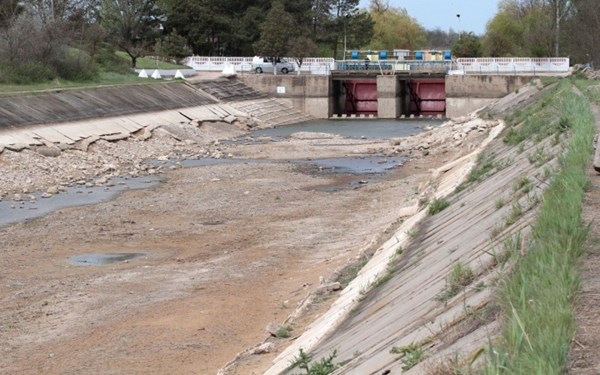Kyiv: Ukraine will supply water to Crimea only in the event of humanitarian disaster
Ukraine can resume the supply of fresh water to Crimea only in the event of a humanitarian disaster on the peninsula, said Ukrainian Prime Minister Denys Shmyhal in an interview with Radio Liberty.
"Of course, Ukraine anywhere, in Crimea or elsewhere, will provide Ukrainians with water and all necessary, medicines, food and so on," he said.
At the same time, Shmyhal noted that Kyiv will not supply water to "occupiers, occupation troops, for the needs of military bases."
According to the head of the Ukrainian government, it is technically impossible to supply water from the Dnieper river to the peninsula. "The Crimean canal is blocked, and journalists have done more than one investigation that it is impossible to supply water in Crimea with the existing infrastructure, it is necessary to invest, to repair this infrastructure," he explained.
Until 2014, when Crimea was annexed by Russia, water from the Dnieper was supplied to the peninsula through the North Crimean Canal, which provided 85% of the territory's agricultural needs in fresh water. However, later the Ukrainian authorities closed the floodgates of the canal. In 2017, the authorities of Kherson region built a dam, which completely blocked the supply of water to Crimea.
In March, Shmyhal called the water supply to Crimea a matter of humanitarian responsibility . At the same time, he added that Kyiv does not have a technical ability to supply water to Crimea until it is "returned" to Ukraine. In June, the prime minister said that "the restoration of the supply of water through the Crimean Canal is not on the Ukrainian government’s agenda."
The peninsula receives drinking water from fresh reservoirs. In early February, the Simferopol authorities reported a shortage of water. The city administration said that they plan to introduce a schedule for cold water supply in the mornings and evenings and turn off the hot water on all days except weekends. Later, the Crimean authorities decided not to limit the supply of water, as the reserves in reservoirs were replenished due to rain. The head of Crimea Sergey Aksenov said in mid-June that three reservoirs providing Simferopol were at 30% capacity and water supply in them will last more than 90 days.
In February 2014, armed people in uniforms without insignias appeared in Crimea and captured the Supreme Council of Crimea, the Simferopol Airport, the Kerch ferry crossing and other strategic objects, and prevented the Ukrainian army from taking action. Initially, the Russian government refused to acknowledge that these armed people were Russian soldiers, but President Vladimir Putin later admitted it.
On 16 March 2014, a referendum on the status of Crimea was held in Crimea and Sevastopol, in which the inhabitants supposedly voted for the peninsula to become part of Russia. The outcome of the so-called referendum is not recognized by Ukraine, the EU or the US. On 18 March, Putin announced the “annexation” of Crimea to Russia.
International organizations have declared the annexation illegal and condemned Russia’s actions. Western countries have imposed economic sanctions on Russia in connection with the annexation. Russia claims to have “restored historical justice”. Ukraine’s parliament, the Verkhovna Rada, declared 20 February 2014 the start of Russia’s temporary occupation of Crimea and Sevastopol.
